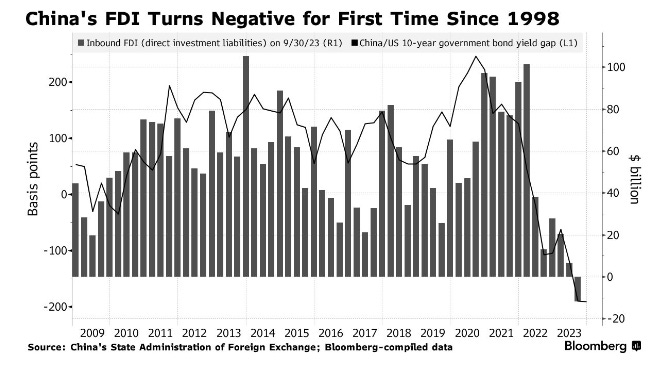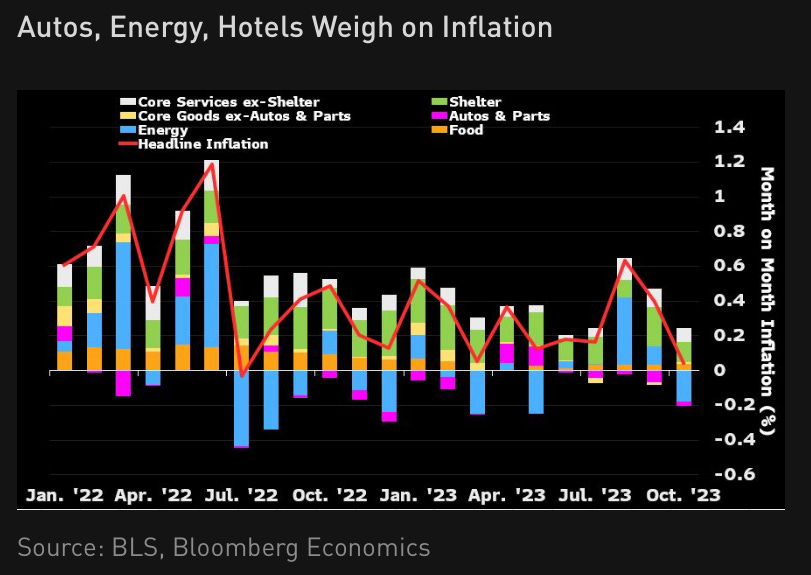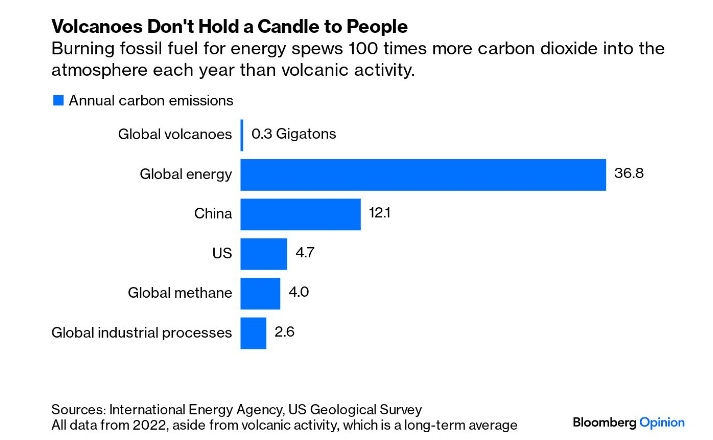Weekly Good Reads: 5-1-1
10 Trends 2024, Year-end rally, CO2 emissions, Wash sale, OpenAI turmoil, Heart health
Welcome to Weekly Good Reads 5-1-1 by Marianne O, an investment practitioner and author of
about investing, economy and wellness ideas. Every week I include 5 links to relevant economic and investment, finance and wellness/idea pursuit as well as 1 important chart and 1 term to know. All the Weeklies are here and here is the index of charts and terms. You can easily subscribe to my newsletter by clicking below.In the spirit of Thanksgiving, I am particularly grateful to
and for recommending my newsletter and to you for reading 🙏.Market and Data Comments
The APEC meeting in San Francisco this past week yielded more high-level military communications and hopefully better fentanyl control and climate coordination between the US and China, phone calls between the 2 presidents and pandas for the US.
Note what President Xi stressed: China does not plan to surpass or unseat the US, and, likewise, the US should not scheme to suppress or contain China. The more conciliatory tone also happened against the backdrop of foreign direct investment into China turning negative for the first time since 1998 (see chart above).
US economic news continues to point to economic slowdown and disinflation: (1) core good and services inflation continues to fall in October as well as oil prices in October, keeping headline CPI flat and core inflation falling to a monthly increase of 0.2%. (2) US October retail sales fell 0.1% on the back of higher consumer interest rates and slowing income growth.
The market, not echoed by the Fed, now prices in no more Fed hikes and almost 90bp cut in interest rate in 2024. Stocks and bonds both rallied this week.
Europe, due to the sluggish economy, will likely see rate cuts earlier than the U.S. Meanwhile, Japan surprised with a Q3 q-o-q annualized contraction of 2.1% and looks likely to contract further. This is despite rising inflation expectations. Bank of Japan looks less likely to give up yield curve control any time soon anchoring short rates at -0.1% and allowing flexibility for long bond yield to move to 1% (now at 0.75%).
This coming week, we will monitor the release of the US FOMC minutes on Tuesday and the OPEC+ meeting. So far the oil agencies and OPEC and IEA expect robust oil demand (exceeding supply) next year.
Economy and Investments (Links):
Tom Standage’s ten trends to watch in 2024 (The Economist)
Biden-Xi Talks Lead to Little but a Promise to Keep Talking (NY Times)
Is the Stage Set for a Year-End Rally? (WSJ or click here)
This latest rally has been different: Tech has still done well, but the real winners have been real estate, utilities and materials—sectors which suffer when rates are high and have had lackluster earnings compared with expectations. It goes to show how broader market sentiment depends on relief from higher bond yields.
~ WSJ
Finance/Wealth (Link):
Higher Bond Yields Mean Retirees Can Pull a Bit More From Savings (Wealthmanagement.com)
+ My New Book: Same as Ever (Morgan Housel)
Quoting The Federalist how Housel applies investing principles to life in general:
While finance can be esoteric, Housel brings out the broad applications of investing principles, often concluding, “A lot of things work like that.” A good reputation, marriage, and investment all compound slowly over time, but they can be ruined in a matter of minutes. If you have enough stability to handle short-run problems in your portfolio or career, you can stick around for the long-term gains. You must keep running to stay in place in your relationships, your business, your career because no competitive advantage or one-time effort makes success permanent.
Wellness/Idea (Link):
How Stress Affects Your Heart Health (Time)
Stress-heart connection:
The effect stress has on blood pressure is just one of many theorized ways that stress may lead to heart trouble. “With stress, it’s difficult to pinpoint the exact way it’s doing damage, but we know one of the end products of stress is inflammation,” Makaryus says. While stress usually leads to temporary increases in inflammatory activity, chronic stress can produce persistent low-grade inflammation. This sort of simmering, all-the-time inflammation has been tied to heart disease, but also to Type 2 diabetes, depression, and other illnesses of the mind and body.
Suggestions to reduce your risk: adopt the “time-tested elements of a healthy lifestyle—regular exercise, a proper diet, good sleep, and time spent with friends—can help a person recover from stress and reduce their risks for stress-related health problems.”
+ The Science of AI with Yejin Choi (Gates Notes)
My takeaway is that in the future Language Models may be smaller and be focused on a particular domain e.g. Maths. The LLMs (large language models) have been trained on web data which have a lot of general information and are good at sequencing but not at abstracting important or conceptualizing information (like humans). In the next few years, we may be able to teach machines how to conceptualize better and apply the training to specific domains to improve the results of the ChatGPTs.
An extra read on Open AI management turmoil: The Perpetual Rise of Sam Altman (Open AI) Takes an Unexpected Turn (Bloomberg) and this is not the end of this story …
One Chart You Should Not Miss: Volcanoes won’t spill more than humanity
One Term To Know: Wash Sale
A wash sale happens if an investor sells a security (or ETF, mutual fund) at a loss and buys an identical or similar security either 30 days before or after that sale date, the investor cannot offset that investment loss against income. Bond or preferred stock of the same company is not considered as similar/identical securities to the common stock.
The IRS implemented the wash sale rule to prevent people from minimizing their tax liability by selling something at a loss to offset earned income and then shortly buying the same or similar thing at an even lower price.
The U.K. has a similar rule called bed and breakfasting.
However, investors do not lose the claim to the trading loss of a wash sale; the claim is just delayed. The loss can be applied to the cost basis of the most recently purchased security. This increases the cost base of the newly purchased security. The holding period of the sold security can also be added to the holding period of the just purchased security, thus increasing the chance of the newly purchased security being taxed at the more favourable long-term capital gains tax rate.
Please do not hesitate to get in touch if you have any questions! If you like this weekly, please share it with your friends or subscribe to my newsletter.









Thank you Marianne. Happy Thanksgiving to you.
Thanks for the mention Marianne! Happy to stay in touch with great writers and finance professionals.